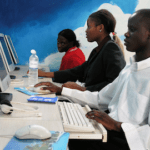An African Approach to Online Education: An Innovative Platform Aims to Prepare the Continent’s Youth for the Jobs of the Future
In 2018, I embarked on a six-month journey through Europe, where I connected with Africans employed in global tech companies. While speaking with these tech workers, the revelation that an African professional could leverage their skills and contribute to global companies worldwide astounded me. Listening to these diverse software engineers’ stories, it dawned on me that other Africans could find similar work abroad, if they could more easily access these opportunities and acquire the necessary skills to perform in-demand jobs. That particular trip sowed the seed for AltSchool Africa, where I serve as co-founder and CEO, inspiring our efforts to liberate Africans from the limitations of geography so they could finally build the careers they wanted.
Africa, regrettably, has not historically played a pivotal role in any of the major industrial revolutions, finding itself often relegated to the sidelines in the global landscape of innovation. The critical missing element in our pursuit of progress and participation in global advancement is knowledge. The absence of robust access to — and cultivation of — knowledge has hindered our potential contribution to these transformative eras, underscoring the urgency of a paradigm shift in educational empowerment across the continent.
The African tech workers I met in Europe shared insights into how the internet profoundly influenced their skill development. To compete with their global peers, they found it imperative to acquire knowledge through online platforms. The conventional classroom settings they’d experienced back home had failed to provide education that was relevant to their evolving needs and the growing demands they faced in the workplace, compelling them to dedicate late hours to online tutorials as they strived to bridge the gap between their skill set and that of their counterparts worldwide.
AltSchool Africa emerged with a mission to narrow this disparity, extending an opportunity to anyone eager to acquire sought-after skills. After we launched the company, skepticism prevailed as people debated the feasibility of mastering a new skill entirely online within 12 months, the duration of our training programs. Nevertheless, we defied these doubts, demonstrating the potential of this approach via our school of engineering — the first program we launched, which served as a proof of concept for our future course offerings. Currently, we boast a community of over 1,500 graduates across various learning paths — including software engineering, product design, product marketing and product management — collectively accumulating a remarkable 5 million+ hours of online learning.
Understanding Africans’ Unique Educational Preferences and Potential
When they’re given the opportunity, the enthusiasm for learning among Africans is unmatched. However, traditional foreign educational platforms often overlook a crucial aspect of working with African students: their approach to learning is unique. For us, education is a communal endeavor; we thrive when learning together as a social event. At AltSchool Africa, we cultivate this communal spirit by fostering a supportive environment where learners can engage in collaborative learning experiences, emphasizing the importance of communal learning as a cornerstone of our approach.
The communitarian approach to learning resonates deeply with the principles of Ubuntu, a core African philosophy. It embodies the essence of being African, where the significance of learning extends beyond the individual. Ubuntu teaches that learning, in its truest sense, holds value not just for oneself but for the entire community — a belief ingrained in our cultural fabric and integral to our approach towards education.
By 2050, one in every four individuals on the globe will be African, marking an imminent demographic shift that is already underway. This transformation is beginning to reverberate in the global cultural landscape, as evident in the music that captivates audiences worldwide, the influence of our movies, the diversity of our fashion, and the dynamism of our politics. In each of these areas, Africa is taking center stage primarily due to the richness of its human resources.
Amidst this changing global paradigm, it’s imperative to reimagine Africa’s role and significance. The crucial question arises: How can we ensure that African youths possess the necessary skills to access promising career prospects, both within and outside their homelands? Furthermore, how can we empower them to engage competently and excel alongside their global counterparts?
Providing Africans with Modern Skills for 21st Century Jobs
The 21st century has ushered in a swift evolution in the way we work, presenting a landscape of new opportunities and challenges. In many countries, particularly in the Global North, enrollment in higher education is on the decline, prompting a call for educational systems to better align with our technologically advanced society. Like other students around the world, Africans today deserve an education that is not only relevant but also modernized and tailored to equip them with the essential 21st-century skills they need to thrive in this rapidly changing world.
To better understand these students’ needs, consider the example of Nigeria — the continent’s most populous nation. Like many other African countries, it currently faces significant challenges. Approximately two-thirds of its 213 million citizens live on less than $2 a day, highlighting substantial economic hardships. Additionally, the nation grapples with prevalent extremist violence and banditry, contributing to a complex security landscape. These issues, and many others, are common throughout the region. And securing employment — let alone gainful employment — remains a daunting challenge in Nigeria and across the continent. Yet the youth in Africa are also experiencing unprecedented levels of education and connectivity. In 2020, 44% successfully completed lower secondary education, a significant increase from the 27% recorded in 2000. Moreover, approximately 570 million individuals across the continent have embraced internet usage. These trends have left them primed for emerging employment opportunities — and not just in the tech field.
For instance, one growing source of employment for African youth is the creative economy — a $2 trillion global industry that generates nearly 50 million jobs worldwide. African artists are filling stadiums and selling out shows in countries around the world. To take just one example, Burna Boy became the first African artist to sell out an American stadium. Meanwhile, Afrobeats songs were streamed over 13 billion times on Spotify in 2022, up from 8 billion in 2021, and the genre’s biggest hit, Rema’s “Calm Down,” was a fan phenomenon at the soccer World Cup in Qatar.
Wherever I travel worldwide, the vibrant sounds of Afrobeats resonate, filling restaurants, shows, taxis — you name it, the fervor is omnipresent. The global wave of Afrobeats has truly permeated diverse cultural spaces. Moreover, African fashion has taken center stage, with dedicated showcases in prestigious fashion capitals like Paris and Milan, marking a momentous recognition of its influence and artistic significance.
The creative economy is gaining prominence in Africa for various reasons, including the continent’s youthful population, rapid digital transformation, global market access and potential for inclusive development. AltSchool Africa is playing a pivotal role in preparing workers to participate in this creative economy by providing training in creative arts, and the career paths commonly pursued in the sector. We are making sure that those interested in exploring occupations in the creative economy can readily access all the necessary resources they need to learn and grow in these fields. We take the same approach in our schools of engineering and business, preparing students to take advantage of opportunities from across Africa, Europe and the U.S.
Making Education Accessible, Inclusive — And Affordable
This approach has enabled us to gain substantial traction among African youth. At the heart of our success lies a commitment to accessibility, inclusivity and communal learning. Conventional educational models often erect barriers based on costs, geographic limitations and resource availability. At AltSchool Africa, we transcend these hurdles by delivering our programs online, thereby enabling learners from diverse corners of Africa to access top-tier education and skill-enhancement opportunities seamlessly. Our online platform ensures that individuals, irrespective of their location or socioeconomic background, can access high-quality education and upskilling initiatives.
We recognize the economic challenges faced by many Africans, and to address this, we’ve intentionally priced our diploma programs at just $1 per day, ensuring affordability for all. Moreover, in our commitment to accessibility, we actively secure scholarships from generous donors to support those unable to pay these fees. Through this scholarship initiative, we aim to ensure that financial constraints never become a barrier to accessing the quality education and skill development opportunities we provide.
AltSchool Africa’s rapid growth is a testament to the viability and demand for innovative educational solutions in Africa. Year after year, we’ve expanded our reach, enrollment and the diversity of our course offerings. And the opportunity to build upon this success for AltSchool Africa and similar institutions is substantial. As Africa’s digital and creative economies continue to grow, there is a growing demand for skilled professionals in various fields. By embracing principles of inclusivity, accessibility and adaptability — combined with a uniquely African approach — we’re not only reshaping education but also contributing to the development of a dynamic and prosperous Africa.
Adewale Yusuf is the CEO and Co-Founder of AltSchool Africa.
Photo courtesy of Kojo Kwarteng.
- Categories
- Education, Technology



